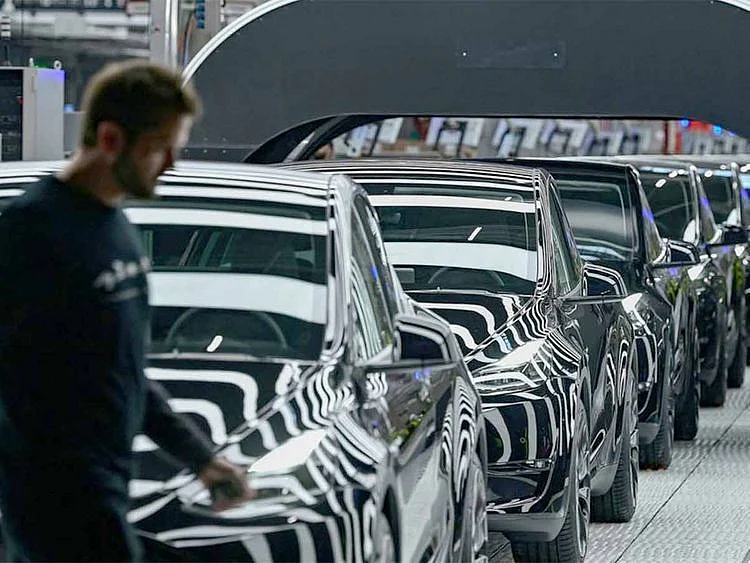Tesla in Manila? Philippines offers generous incentives to EV makers, buyers
New rules allow the Asian country to pursue ‘low-carbon future’

Manila: Macario Gomez, 42, is a Singapore-based Filipino engineer. He’s seriously thinking about buying his dream electric vehicle (EV) this 2023 — “most likely if the price falls below Php1.8 million ($32,900),” he told Gulf News.
Following a price war kicked off by Tesla, which slashed 20 per cent off its hottest models, Gomez says he's a keen first-adopter. What adds extra kick to the excitement, however, is a new law.
The legislation, known as EVIDA, changes the game altogether, starting with a raft of incentives for EV buyers, and the industry as a whole.
Currently, there aren’t too many options available for Gomez. Yet, he represents a total addressable market of about 2 million individual overseas Filipino workers and their families, out of the 10 million members of the diaspora.
16 EV models available
Competition is hotting up. Tesla recently set up a shop in Bangkok. BYD’s Dolphin EV is now available in Manila, but only in limited numbers.
Geely hopes to offer its EX3 “EV for the masses” — an all-electric variant with a claimed single-charge range of 322 km (starting price reportedly at Php471,000, or about $8,600).
Nissan has also rolled out Kicks, a series hybrid (fully-electric powertrain, with a petrol engine to charge the batteries), which has a claimed range of 900km on a full tank for Php1.224 million ($22,380).
Hyundai has its Kona subcompact crossover EV for Php2.37 million ($43,342). Toyota offers a number of options (including the Php2.35-million 2023 Prius and Corolla Cross hybrid for Php1.68 million).
As of last count, there are 16 EV/hybrid models available in the Philippines, including the likes of high-end Porsche Taycan, BMW iX and Audi RS E-tron GT, as well as the mass-market Nissan Kicks e-POWER and BYD E3.
Compared to other countries, however, the pickings here are still limited. No surprise that in October 2022, there were only 9,000 registered EVs in the country.
Changing landscape
That may change soon. This is thanks in a big part fo EVIDA, or the Electric Vehicle Industry Development Act (RA 11697), passed in April last year, with implementing rules adopted in September.
Currently, Gomez’s biggest concern are charging stations, or the lack of them. “Charging infrastructure (especially) when driving more then 400 km,” he told Gulf News.
The new law provides for "green routes”, giving preference for EVs in road usage. There are tax incentives. Fiscal and non-fiscal incentives for EV manufacturing, and importation of charging stations are allowed. Importing completely-built EVs are entitled to incentives.
Even the issue of installation of charging points could rapidly change, following the issuance of implementing rules of the EVIDA law, which allows for tax-free imports of chargers for 8 years, until 2030.
Excise tax exemption
In the Philippines, EVs are fully exempt from excise tax, based on TRAIN Law. An excise tax is a legislated tax on specific goods or services at purchase.
According to new law, people who drive EVs and hybrid vehicles on Philippine roads will be exempt from number coding (road congestion scheme).
What we know so far:
What is EVIDA law?
Republic Act (RA) 11697, or An Act Providing for the Development of the Electric Vehicle Industry (EVIDA Law), kicked in on April 15, 2022.
New EV rules released?
The Departments of Energy (DoE) and Transportation (DoTr) issued the implementing rules and regulations (IRR) for EVIDA on Sept. 8, 2022. The IRR became effective on September 20, 2022, following months of consulations with industry stakeholders.
“Other challenges remain in implementing and issuing additional implementing rules and regulations,” Philippine Energy Secretary Raphael Lotilla told local media. “Still, I am sure, and I am confident that we will be able to move on those.”
What are the key provisions of EVIDA?
It provides for a Comprehensive Roadmap for the Electric Vehicle Industry (CREVI), an ambitious national development plan for the EV industry.
Specifically, it calls for an annual work plan to accelerate the development, commercialisation and utilisation of EVs in the country.
Vehicles covered by RA 11697 and its implementing rules include battery electric vehicles (BEVs), Hybrid vehicles, plug-in hybrid electric vehicles (PHEVs).
What are the components of CREVI?
There are four components:
What are the incentives under EVIDA?
The law provides the following fiscal incentives:
Manufacturing
The manufacture and assembly of EVs, their charging stations, batteries and parts and components shall undergo an evaluation process to determine its:
Non-tax perks
There are non-tax incentives for EVs, too:
What happens next?
The Philippines' new EV legislation is a world away from when Teslas were banned on Philippine roads for being "low-speed vehicles", under a now-scrapped classification system.
EVIDA goes the extra mile: it mandates dedicated parking slots for EVs, installation of charging stations in parking lots and petrol pumps, as well as incentives for EV manufacturing.
For 8 years under the new law, importation of completely-built charging stations shall also be exempt from the payment of duties (2022 to 2030). And by law, at least 5-percent corporate and government fleets must be EVs.
When paying for motor vehicle user’s charge, a 30 per cent discount is mandated for full-battery EVs and 15 per cent for hybrid until 2030)
The drive towards renewable transport has started in earnest in the Philippines, a major importer of fossil fuels. In 2021, the country imported 18.7 billion liters of petroleum products, with diesel accounting for more than 8 billion liters of those imports.
Amid intense competition in the EV space, and incentives in place to woo EVs, it’s just a matter of time before its knock-on effect is felt on the roads — and in the air.
Sign up for the Daily Briefing
Get the latest news and updates straight to your inbox
Network Links
GN StoreDownload our app
© Al Nisr Publishing LLC 2026. All rights reserved.